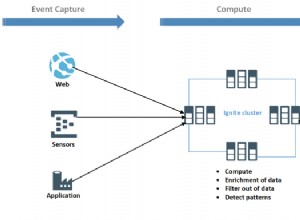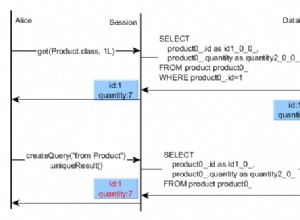Méthode Java Float classe floatToRawIntBits() avec exemple
Méthode floatToRawIntBits() de la classe flottante
- méthode floatToRawIntBits() est disponible dans le package java.lang.
- méthode floatToRawIntBits() suit les normes à virgule flottante simple précision IEEE 754 et selon les normes, il renvoie les bits qui dénotent la valeur à virgule flottante tout en préservant la valeur NaN.
- méthode floatToRawIntBits() est une méthode statique, elle est également accessible avec le nom de la classe et, si nous essayons d'accéder à la méthode avec l'objet de la classe, nous n'obtiendrons pas non plus d'erreur.
- méthode floatToRawIntBits() ne lève pas d'exception au moment de représenter les bits tout en préservant NaN (Pas un nombre).
Syntaxe :
public static int floatToRawIntBits(float f);
Paramètre(s) :
- float f - représente la valeur à virgule flottante simple précision.
Valeur renvoyée :
Le type de retour de cette méthode est float, elle retourne les bits qui représentent la valeur à virgule flottante simple précision.
- Si nous passons "l'infini positif" , il renvoie la valeur "0x7f800000" .
- Si nous passons "l'infini négatif" , il renvoie la valeur "0xff800000" .
- Si nous passons "NaN" , il renvoie les valeurs NaN réelles (c'est-à-dire qu'il ne réduit pas tous les bits codant un NaN en un "basique" valeur NaN).
Exemple :
// Java program to demonstrate the example
// of floatToRawIntBits (float f)
// method of Float class
public class FloatToRawIntBits {
public static void main(String[] args) {
// Variables initialization
float value1 = 18.20f;
float value2 = 19.20f;
// Display value1,value2 values
System.out.println("value1: " + value1);
System.out.println("value2: " + value2);
// It returns the bits denoted by the single precision
// floating point argument by calling
// Float.floatToRawIntBits(value1)
int result1 = Float.floatToRawIntBits(value1);
// It returns the bits denoted by the single precision
// floating point argument by calling
// Float.floatToRawIntBits(value2)
int result2 = Float.floatToRawIntBits(value2);
// Display result1,result2 values
System.out.println("Float.floatToRawIntBits(value1): " + result1);
System.out.println("Float.floatToRawIntBits(value2): " + result2);
System.out.print("Float.floatToRawIntBits(NaN): ");
System.out.println(Float.floatToRawIntBits(5.0f % 0f));
}
}
Sortie
value1: 18.2 value2: 19.2 Float.floatToRawIntBits(value1): 1100061082 Float.floatToRawIntBits(value2): 1100585370 Float.floatToRawIntBits(NaN): 2143289344



